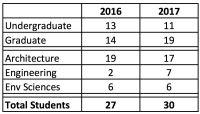Issues of Health in Architectural Education: Complexity, Interdisciplinarity, and Frameworks

Increasing interest is seen at the intersection of architecture and health. Engaging students in these inquiries surrounding health is important in preparing them for future practice, regardless of the specific building type on which they ultimately focus.
This paper reviews the implementation of one such course focusing on the well-being and overall health of the occupant, using the frameworks of the WELL Building Standard and the Living Building Challenge (LBC). The reviewed course engages interdisciplinary teams composed of students from the School of Architecture, the College of Engineering, and the College of Natural Resources, with private practice. Through these partnerships, students focus on real-world projects as case studies to conceptually assess health and well-being implementation strategies, lending prominence to wider sociocultural influences surrounding the topic of health in the built environment.
The course has been specifically designed to: (1) establish a framework for common content relating to health in the built environment across disciplinary boundaries; (2) build meaningful partnerships between a variety of student focus areas through intentional exercises; and (3) establish a common vocabulary between architectural education and aligned disciplines regarding health and the built environment. The course structure, activities, and assessments are reviewed, proposing a solid template for including integrated design and themes of health in architectural education and providing methods for sharing the value of the architectural education process across campus.
keywords: health and well-being; built environment; interdisciplinary; sustainability; course development


Add comment
Log in to post comments